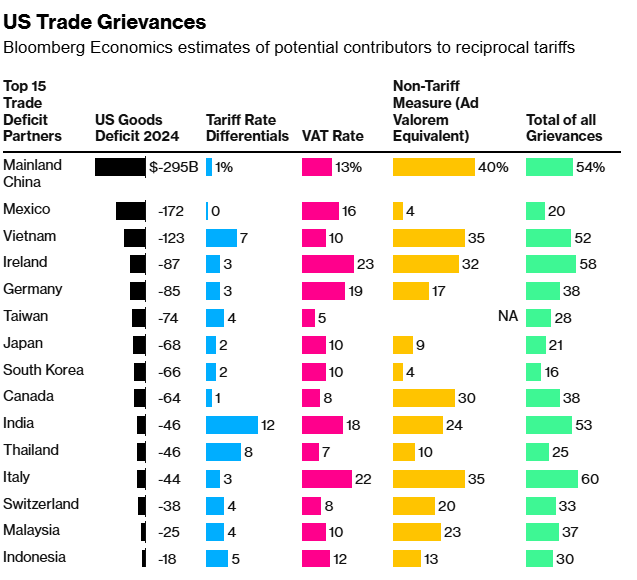Trump Tariffs Threaten US Bitcoin Mining as China Hits with 34% Export Duty

Trump's new tariff policy could negatively impact the US Bitcoin mining industry as China, the world's largest producer of mining equipment, faces a high 34% export tariff, putting pressure on US miners' profitability.
On April 2, Trump signed a sweeping order imposing retaliatory tariffs on all countries that impose tariffs on U.S. goods. The base rate was set at 10%, with implementation scheduled for April 5. Some countries faced significantly higher rates, such as Thailand and Malaysia, which received tariffs of 36% and 24%, respectively, starting April 9.
 Source: Bloomberg
Source: Bloomberg
The announcement sent shockwaves through financial markets, with the cryptocurrency sector being one of the first to react. Bitcoin (BTC) fell from $85,238 to $82,526 by the close of the day, a drop of 3.18%. The broader cryptocurrency market followed suit, with the total cryptocurrency market capitalization declining by around 4% between April 2 and April 3.
Shares of crypto companies listed on U.S. exchanges were also hit hard. Coinbase Global fell 7.7% and MicroStrategy shares fell 5.6% on the day of the announcement.
You may also like: Cryptocurrency markets fall after Liberation Day tariffs
In addition to lowering cryptocurrency and stock prices, the new tariffs could cause significant disruption to the Bitcoin mining industry. China, which remains the world’s leading producer of mining equipment, now faces a retaliatory tariff of 34% on exports to the United States. This poses challenges for American Bitcoin mining companies, especially given that the United States has become the world’s hub for cryptocurrency mining after China banned the practice entirely in 2021.
“The U.S. has become an attractive destination in recent years, not just because of energy prices but also because of legal, regulatory, and economic stability,” CodeStream CEO Gadi Glickberg told Bloomberg. “The recently imposed tariffs are unlikely to result in a mass exodus. However, they could slow or redirect future expansion plans as miners reconsider the long-term financial viability of expanding operations in the U.S.”
With tariffs set to go into effect tomorrow, bitcoin mining equipment suppliers are rushing to ship out the last of their shipments before the tariffs go up. Taras Kulik, CEO of mining equipment brokerage Synteq Digital, told Bloomberg that his company is scrambling to expedite the delivery of thousands of units from Southeast Asia, including Indonesia, Malaysia, and Thailand.
Amid this volatility, mining hardware manufacturers are preparing for long-term changes to their operations. Bitmain Technologies, the world’s largest Bitcoin mining hardware maker, announced plans in December to open a factory in the U.S. Another manufacturer, MicroBT, signed a deal with Riot Blockchain, one of the largest U.S. miners, to leverage its U.S. manufacturing presence.
Investors are already factoring in the long-term implications of Trump's tariff decision: Shares of several U.S.-listed mining companies, such as MARA Holdings and CleanSpark Inc., fell about 10% after the announcement.
You might also like: Opinion: Why Trump's 'Liberation Day' Tariffs Could Hurt the Global Future of Cryptocurrencies
Source: cryptonews.net



